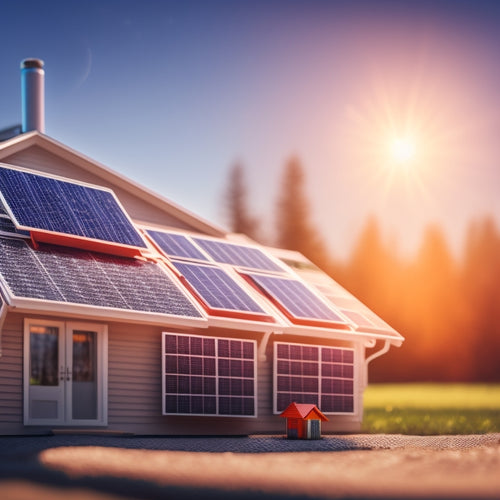
House Solar Battery System
Share
You're considering a house solar battery system to break free from utility company reliance. This system enables you to generate, store, and manage your own clean energy, reducing your carbon footprint and energy bills. By capturing renewable energy from solar panels and storing it for later use, you'll have greater control over your energy usage and costs. As you investigate solar power integration, you'll find that high-performance deep cycle storage solutions provide a reliable power supply, and understanding battery specifications is key to peak system performance. Now that you've started to utilize the power of solar energy, you'll want to uncover more about customizing a system that suits your unique needs and lifestyle.
The Essentials
- House solar battery systems enable energy independence by utilizing renewable energy sources and reducing reliance on utility companies.
- Solar power integration with battery storage reduces peak demand charges, lowers electricity bills, and provides greater control over energy usage and costs.
- Deep cycle battery design and proper maintenance are crucial for effective solar battery systems, enhancing battery cycle life and system longevity.
- Understanding battery specifications, including cell chemistry options, energy density, and lifespan, ensures optimal system performance and selection of the best battery for solar energy needs.
- Daily energy usage analysis is essential for effective solar battery system design, identifying peak consumption times for optimization and opportunities to reduce energy consumption.
Energy Independence At Home
With a house solar battery system, you're taking the first step towards energy independence at home by utilizing a renewable energy source that reduces your reliance on the grid.
This means you'll be generating clean energy and storing it for later use, allowing you to power your home even when the sun isn't shining.
By going off-grid, you'll have more control over your energy usage and costs, and be less affected by utility rate hikes.
With a home battery storage system, you can reduce peak demand charges and lower your electricity bills by storing excess energy generated by your solar panels, giving you greater control over your energy costs and usage.
Renewable Energy Source
Your own rooftop becomes a power plant when you employ renewable energy, breaking free from reliance on the grid and achieving energy independence at home.
By capturing solar power, you're tapping into a clean and abundant resource that reduces your environmental impact. This sustainable solution not only benefits the planet but also your wallet, thanks to solar incentives and increased battery efficiency.
With the integration of a house solar battery, you can store excess energy generated by your solar panels, ensuring a steady supply of power even during periods of low sunlight.
Off Grid Living
Energy independence at home is within reach when you combine solar panels with a house solar battery system, allowing you to unplug from the grid and enjoy the freedom of off-grid living.
With this setup, you'll generate your own electricity and store it for later use, reducing your reliance on the utility company and minimizing your carbon footprint.
By leveraging a high-performance Deep Cycle Power Storage solution, you can guarantee a seamless and reliable power supply that maximizes energy storage and minimizes maintenance.
This sustainable lifestyle choice not only benefits the environment but also provides energy resilience, shielding you from power outages and rate hikes.
Reduced Carbon Footprint Guarantee
You're about to greatly reduce your carbon footprint by switching to a house solar battery system, which guarantees a substantial decrease in emissions today.
By utilizing the power of the sun, you'll be generating eco-friendly energy that's not only sustainable but also environmentally responsible.
With the help of long-lasting battery solutions, you can store excess energy generated during the day for use during the night, reducing your reliance on the grid.
You'll be contributing less to greenhouse gas emissions, creating a cleaner, healthier environment for future generations.
Lower Emissions Today
By integrating a house solar battery system, homeowners can greatly lower their emissions today, taking an important step towards a cleaner environment.
You'll be utilizing the power of solar energy, a renewable resource that reduces your reliance on fossil fuels and subsequently decreases your carbon footprint. This emissions reduction strategy is particularly effective, as it allows you to store excess energy generated during the day for use at night or during power outages.
One of the major solar energy benefits is the ability to offset your energy consumption from the grid.
With a house solar battery system, you can considerably reduce your energy bills while contributing to a cleaner environment. By reducing your emissions, you're playing a crucial role in mitigating climate change and promoting a healthier planet.
Eco-Friendly Energy Solutions
With a house solar battery system, homeowners like you can confidently opt for eco-friendly energy solutions that promise a reduced carbon footprint.
By utilizing the power of the sun, you'll greatly decrease your reliance on fossil fuels, leading to a cleaner environment and a healthier planet.
As you shift to renewable energy, you'll also benefit from solar incentives that can offset the initial investment costs.
These incentives, combined with the long-term savings on your energy bills, make solar energy an attractive option for those seeking freedom from traditional energy sources.
Proper battery maintenance is essential to guarantee the efficiency and longevity of your solar battery system.
Regular checks and maintenance tasks will help you identify potential issues before they become major problems, keeping your system running smoothly and efficiently.
Deep Cycle Battery Design
You're likely pondering a deep cycle battery design that can withstand the demands of your house solar battery system.
As you investigate renewable energy solutions, it's crucial to reflect on the role of solar panels and inverters in your overall system solar energy storage solutions.
When evaluating options, you'll want to focus on battery cycle life, as it directly impacts the system's overall performance and cost-effectiveness.
You'll also need to choose from various cell chemistry options, each with its own strengths and weaknesses regarding energy density, lifespan, and maintenance requirements.
Battery Cycle Life
As a house solar battery system owner, understanding battery cycle life is vital to maximizing your investment. A battery cycle life refers to the number of charge and discharge cycles it can handle before its capacity drops below a certain threshold. This is significant because it directly impacts the overall performance and lifespan of your system.
Proper battery maintenance plays a significant role in extending battery cycle life. This includes ensuring charging efficiency by avoiding deep discharges, which can reduce the battery's capacity. You should also monitor your battery's state of charge and adjust your charging habits accordingly.
Regular maintenance checks can help identify any potential issues early on, preventing damage to your batteries.
When selecting a deep cycle battery, look for one with a high cycle life rating. A higher rating indicates that the battery can handle more charge and discharge cycles, resulting in a longer lifespan.
Cell Chemistry Options
Selecting the right deep cycle battery for your house solar battery system involves more than just considering cycle life. You need to think about cell chemistry options, which greatly impact performance, cost, and environmental sustainability.
Lithium-ion batteries, known for their high energy density and long lifespan, are a popular choice. However, they can be expensive and may require advanced battery management systems to guarantee thermal stability.
Lead-acid batteries, on the other hand, are more affordable but heavier and less efficient. Nickel-cadmium batteries offer a compromise between the two, but their toxicity raises concerns about recycling options.
Flow batteries, with their flexible design and scalable energy storage, are gaining traction, especially for large-scale systems. Solid-state batteries, still in development, promise even greater energy density and safety.
When choosing a cell chemistry, consider factors like cost efficiency, recyclability, and your specific energy needs. By assessing these factors, you'll find the ideal battery solution for your house solar battery system.
Check Your Energy Usage
You need to understand your energy consumption patterns to design an effective house solar battery system.
Analyzing your daily energy usage helps you identify your daily peak hours, which is fundamental in determining the required battery capacity. By reviewing your past utility bills, you can pinpoint the times of day when your energy usage is highest, and tailor your system accordingly.
Additionally, it's vital to take into account your energy storage goals, such as renewable energy solutions, to guarantee a smooth changeover during outages.
Energy Consumption Patterns
How much energy does your household consume on a daily basis? Understanding your energy consumption patterns is essential in determining the effectiveness of your house solar battery system.
Energy monitoring is important in tracking your energy usage, allowing you to identify areas where you can optimize your consumption. By analyzing your energy consumption patterns, you can pinpoint the times of day when your energy usage is highest and lowest. This information is significant in selecting the right solar battery system for your needs.
Through consumption analysis, you'll be able to identify which appliances and devices are consuming the most energy. This knowledge enables you to make informed decisions on how to reduce your energy consumption, such as replacing inefficient appliances or adjusting your usage habits.
Daily Peak Hours
During peak hours, your energy usage tends to skyrocket, and understanding these daily peak hours is essential in optimizing your house solar battery system. You need to identify when you consume the most energy to maximize solar energy optimization.
Typically, peak hours occur during morning and evening periods when you're getting ready for work or school, or when you're unwinding in the evening. These periods usually see a surge in energy consumption from appliances like refrigerators, air conditioners, and lighting.
To check your energy usage, review your past electricity bills or use a smart meter to track your daily consumption patterns. This will help you pinpoint the exact times when your energy usage peaks.
By doing so, you can adjust your energy consumption habits and optimize your solar energy system to meet your needs during these periods. This, in turn, will improve your battery storage efficiency, allowing you to store excess energy generated during the day for use during peak hours.
Longer Cycle Life Guaranteed
When you invest in a house solar battery system, you expect it to last for a long time.
A longer cycle life guarantee guarantees your battery's extended durability, providing you with a higher return on investment.
With a guaranteed longer cycle life, you can enjoy years of reliable energy storage and reduced maintenance costs.
Extended Battery Durability
Most homeowners who invest in a house solar battery system expect it to last for a significant number of years. To guarantee extended battery durability, you'll want to focus on proper battery maintenance tips. This includes monitoring your battery's state of charge, avoiding deep discharging, and keeping your battery away from extreme temperatures.
You should also perform regular software updates to optimize your solar performance optimization. By following these tips, you can increase your battery's lifespan and reduce the need for premature replacements. A well-maintained battery can last up to 15 years or more, providing you with a reliable source of energy and significant cost savings.
Additionally, a durable battery can help you achieve greater energy independence, giving you the freedom to power your home without relying on the grid. To further extend your battery's lifespan, consider investing in a high-quality battery with a proven track record of reliability and performance.
Look for batteries with built-in monitoring systems and advanced safety features to guarantee your investment lasts for years to come.
Frequently Asked Questions
Can I Charge My Electric Vehicle With a House Solar Battery System?
You can charge your electric vehicle using solar power, but it's essential to contemplate battery efficiency. With a compatible system, you'll utilize solar energy for charging, reducing reliance on the grid and emissions, while optimizing your vehicle's performance.
How Long Does It Take to Install a House Solar Battery System?
As you commence on the expedition to energy independence, you're likely wondering how long it'll take to utilize the power of the sun. Typically, installation takes 1-3 days, depending on the complexity of the job and battery capacity, giving you a timeline to plan your newfound freedom.
Are House Solar Battery Systems Compatible With Existing Solar Panels?
When integrating a battery with your existing solar setup, you'll find that most batteries are compatible with various solar panel brands, ensuring seamless solar panel integration and ideal battery compatibility for your unique energy needs.
Can I Use a House Solar Battery System During a Grid Outage?
When the grid goes dark, you're not left in the dark; you can shine like a guiding light, utilizing solar power with a system that provides grid independence, one of the most significant solar battery benefits, allowing you to ride out outages with confidence.
Does a House Solar Battery System Require Regular Maintenance?
You'll want to perform regular maintenance to maximize your battery's lifespan; follow these tips: check voltage and state of charge monthly, confirm proper ventilation, and update software regularly to guarantee peak performance and extend its lifespan.
Final Thoughts
As you consider a house solar battery system, remember that energy independence is within your reach. With a reduced carbon footprint assured, you'll be breathing easier - and so will the planet. But it's not just about the environment; deep cycle battery design guarantees a longer cycle life, saving you money in the long run. So, check your energy usage and get ready to access the full potential of your solar panels. The question is, are you ready to take the leap and utilize the power of the sun?
Related Posts
-

A Beginner's Guide to Navigating the Solar Investment Tax Credit
You're eligible to claim a significant Solar Investment Tax Credit (ITC) of 30% of total installation costs, but mane...
-

Top 10 Off Grid Camping Gear Must-Haves
When you're off-grid camping, the right gear is crucial for a smooth expedition. Start with a durable, weather-resist...
-

Solar Powered Lights for Sustainable Home Decor
Solar-powered lights offer a stylish and eco-friendly way to enhance your home decor. They capture sunlight, converti...


